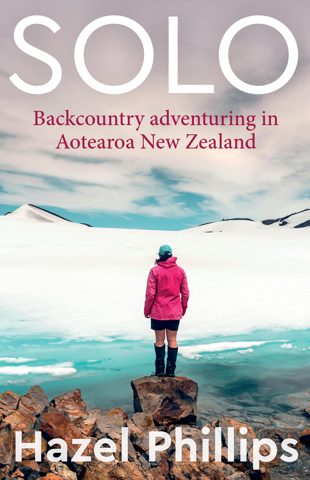Wilderness magazine chats with Hazel Phillips about the experiences behind her new book, Solo: Backcountry adventuring in Aotearoa New Zealand.
‘For three years, journalist Hazel Phillips lived in mountain huts and tramped alone. As she ranged from Mt Ruapehu to Fiordland she had her share of danger and loneliness, but she also grew in confidence and knowledge. Solo: Backcountry adventuring in Aotearoa New Zealand is her story of life in the hills.
Solo does away with heroics and celebrates accessible, progressive adventuring through landscapes many of us know and love. It reads like an invitation to do more. Was this your intention?
It was an exhortation, really, to get out there, give it heaps, and make the most of the time we get. I dedicated the book to Rob Hosking, a friend and former colleague. Rob died from cancer in early 2019 and I began writing the book then, as his death struck me pretty hard. You don’t know how much time you have until you don’t have it anymore. The book was also a love letter of sorts to Mt Ruapehu, which is my home mountain and hence it features prominently.
What would you say to woman adventurers unsure about going it alone?
Just give it a go and harness your self-belief. Start small. Achievement builds confidence, and confidence drives achievement. Don’t let other people’s panicking because you’re a solo woman put you off, and don’t let yourself be shamed into doing or not doing something: make your own choices. Be prepared to turn around if it gets too tough, but don’t stop yourself from trying. (I’m partly saying this to myself, too — I think I could do well to attempt harder things rather than letting other people’s accounts of how hard things are put me off.) I’d also say: you don’t need to look like an Instagram influencer to get out there and do it. Stuff that! The outdoors is for everyone.
Solo is peppered with fascinating historic accounts, including a lot of mishaps. How did researching death affect your relationship to risk?
I have a fearful respect for the mountains and our outdoor spaces, and I reckon I’m usually cautious and risk-averse. I think that hasn’t changed. A friend commented I’d become a bit too obsessed with dead people while writing the book, which was a fair call. I’m also a diver, and while I’m fascinated with how things go wrong in the hills, I can’t stomach reading reports of scuba diving accidents — I know that if I do, I’ll stop diving altogether. Backcountry accidents don’t have the same effect on me.
What was needed to hold down a full-time job and be on the road for three years?
Better access to a washing machine! (I’ll admit I smelled pretty bad a lot of the time.) I have an incredible network of friends and family who were super supportive of my mad missions. In a practical sense, solar charging devices and battery packs help to get the desk job done, while a bivvy bag and tent were crucial for those nights when I had to just bunk down in a random spot somewhere. It necessitates determination and motivation — some sort of purpose to what you’re doing.
How has this adventure changed you?
Some small practical things: I got used to drinking clean, delicious water out of rivers, and even in places like Arthur’s Pass the drinking water is so much better than in cities. It became challenging to sit at a desk again for long stretches of time, and office lights give me headaches. The bigger stuff: I’ve developed more resilience, grit and self-belief. I also used to be a relentless planner and now I’m happier to fly by the seat of my pants a bit more.’


